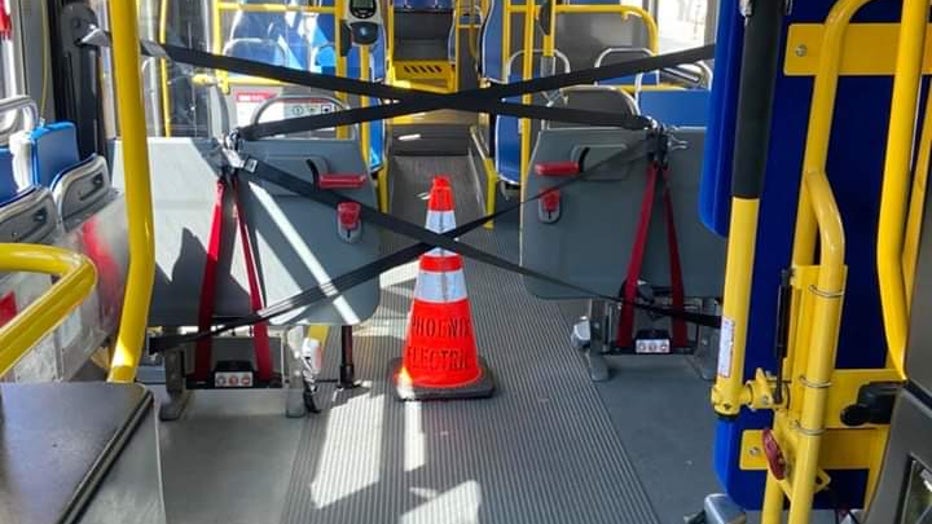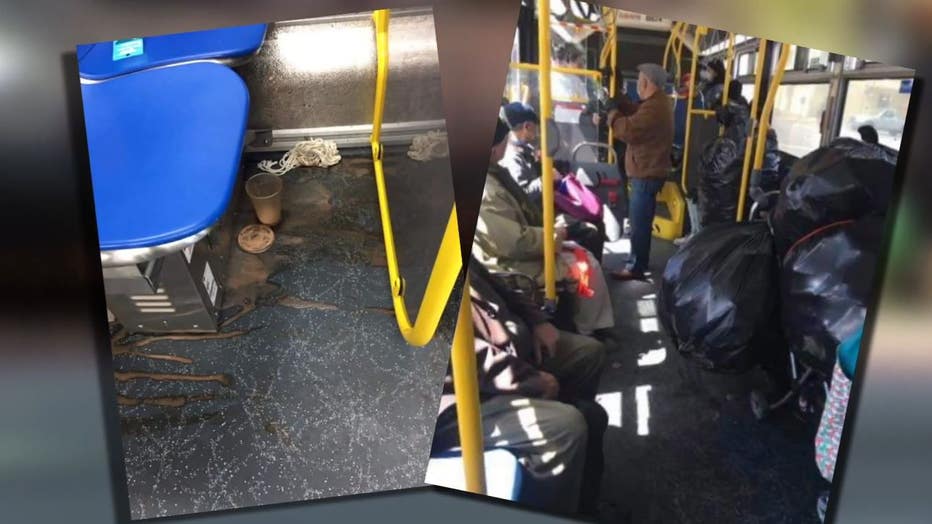Muni bus drivers fearful of coronavirus even with route reductions

Muni bus drivers fearful of coronavirus even with route reductions
Bus operators in San Francisco are still taking matters into their own hands to protect against COVID-19, despite new route reductions and the transportation agency’s urge that only essential workers ride the buses.
SAN FRANCISCO - Bus operators in San Francisco are still taking matters into their own hands to protect against COVID-19, despite new route reductions and the transportation agency’s urge that only essential workers ride the buses.
San Francisco Municipal Transportation Authority (SFMTA) eliminated roughly 40 percent of routes Wednesday, leaving only 15 key routes operating. It’s just one of the things Muni operators have been asking for, for weeks.
“They should have shut down all transit,” one operator who spoke anonymously for fear of retaliation said. “You’re really playing Russian Roulette with your life.”
Numerous operators tell KTVU they don’t feel safe, prepared, or protected and some have chosen to stay home out of fear.
Operators who have stuck around have made homemade signs, created “no-go zones” marked with an ‘X’ and used bungee cables to keep people away from the driver area. They’ve even covered cash fare boxes with tape.

“We’ve got to protect ourselves because they’re not protecting us,” an operator said in a video posted online. “I went ahead and created my own signs and posted them all up around the bus.”
Those signs encouraged social distancing, loading from the rear doors and other precautions to take amid the coronavirus pandemic.
So far, there have been five Muni employees who have tested positive for COVID-19.
“I think they could have acted earlier,” one of the operators with coronavirus said. “I feel like I was one of the numbers that actually helped them move forward more drastically.”
SFMTA said it has provided gloves, surgical masks, wipes and sanitizer to all operators and frontline employees since early March. Due to international shortages, a spokesperson said the agency is working to obtain additional supplies but has provided 6,200 disinfecting wipes per day among its employees, among other things.
Additionally, Muni does daily deep cleanings of the buses and most are equipped with protective glass for drivers, something the agency says sets it apart from other transportation systems.
But the Transit Workers Union Local 250-A said what SFMTA is providing is not adequate.
“We don’t have the equipment and the safety measures set in place,” President Roger Marenco said. “Buses need to be cleaned not just daily, but at each terminal.”

Muni workers shared photos with KTVU of trash left behind, crowded conditions and even carts crammed inside the buses with bags of cans.
Marenco said the union pressured SFMTA to send their most vulnerable drivers home with full pay and reduce service schedules. However, while the current lines are intended for essential workers, operators are seeing an increase in the transient, homeless and mentally ill riders.
“The operators are not only fearing for their own safety, they’re fearing for the safety of their coworkers and their families,” Marenco said. “I think that in order for them to make swift changes, I think somebody’s going to have to die.”
SFMTA Director Jeffrey Tumlin said operators were assuming some risks each day and announced the major route changes at a press conference with San Francisco officials Monday.
“As a lifelong advocate of transit, I never thought I would say this but, please if you have any other option for getting around, please do not ride Muni,” he said. “We’re experiencing significant crowding on some key lines.”
Muni is still transporting about 100 thousand people a day and SFMTA encouraged drivers to skip stops if there are too many people aboard.
Tumlin hopes increasing staff on the 15 critical routes will reduce social risks, despite knowing drivers are still vulnerable.
“They are heroes in San Francisco,” he said. “I couldn’t be more proud.”
Brooks Jarosz is an investigative reporter with KTVU. Email him at brooks.jarosz@foxtv.com or follow him on Twitter: @BrooksKTVU

